- Home
- Barry Eisler
Inside Out: A novel Page 6
Inside Out: A novel Read online
Page 6
6
Don’t Want to Wind Up Like Him
The next morning, Ben was slowly circling Belthorn Drive in Kissimmee, Florida, a half-hour drive southwest of the airport in Orlando. According to Hort, this was the current residence of Larison’s “widow,” now going by her maiden name, Marcy Wheeler. For the moment, Wheeler was pretty much the only actionable thing they had to go on.
He drove, his head sweeping back and forth, absorbing information, looking for the detail that didn’t fit: a parked car with a couple of hard-looking men inside, a van with darked-out windows, a man in shades strolling along and somehow not from the neighborhood. Nothing tickled his radar. Belthorn was a sleepy collection of modest ranch houses being inexorably replaced by more imposing McMansions. But for the heat and the occasional palm tree, it could have been a suburban street in just about any lower-middle-class American neighborhood transitioning from older families and long-standing homes to younger, more aggressive colonists, newcomers with more of a need to make a statement and more appetite for the housing debt such statements required.
Wheeler lived in one of the older, smaller homes, a one-level yellow rectangle that looked like it contained one or at most two bedrooms and that badly needed a fresh coat of paint. Ben parked at the end of the street, far enough to keep Wheeler from seeing the license plate on his rented car, near enough to watch the house. Hort had told him Wheeler had a son, and it was almost time for school.
He watched and waited, hoping he was doing the right thing. He knew he couldn’t trust Hort the way he once had, not after what had happened with Alex and Sarah. But at the same time, when the op was blown, Hort had immediately stood down. He could have killed all three of them—should have, in fact, from a strictly operational perspective—but instead, he had let them walk away. Why leave all those loose ends? Ben could only surmise that it had been personal, that Hort had almost been looking for a reason to not follow his orders. But was that enough reason to trust the man now?
On the other hand, what were the alternatives? Leave the unit and join a private outfit? He could, he supposed. With the government stretched so thin, men with his credentials were making a mint as contractors. Even elite groups were having to offer retention bonuses, bonuses that more often than not didn’t work.
Yeah, he should do it. Three years as a contractor in someplace like Somalia and he could practically retire.
Ah, bullshit. The truth was, he liked being in the unit. Partly it was the training. He shot with Delta, jumped with the Smokejumpers, and learned his tradecraft from grizzled CIA survivors of Denied Area operations. He enjoyed the pride, the quiet swagger that came with being ISA. There were maybe three hundred men, not just in America, but in the world, who could legitimately claim to be his peers. That was saying something.
But it was more than that. He liked being on the inside. He liked knowing the secrets, the way things really worked, the real world beneath the surface everyone else inhabited. Contractors had the salary, and maybe they still had the swagger, but they didn’t have the inside position. And he didn’t want to give that up.
And why should he? What else did he have? A daughter who thought he was dead, an ex-wife who wished it were so … crap, it hurt, but when he was alone with his thoughts like this, he had to admit his life was a mess. He was glad he and Alex had managed to mend some badly broken fences recently, that was something. But what had it really changed? They weren’t attached by much more than blood before, and it wouldn’t be all that different now.
And Sarah? Their chemistry was pretty unbelievable, it was true. They couldn’t have been more different and at first he thought she hated him. Which maybe on some level she did, but then they’d wound up in bed anyway. He’d initially tried to pass it off as the effects of shared danger and a combat hard-on, but the truth was, it felt like more than that.
Even so, the only reason she’d let herself get close was because she didn’t really understand what he did. How could she understand? They were from totally different worlds. And let’s face it, she was the kind of person who was more comfortable pretending his world didn’t even exist. Which was ironic, because as far as he was concerned, it was her world—a world where violence never solved anything and where no one was evil, just misunderstood, and all people were fundamentally rational and could be reasoned with—that was the illusion, the pretty veneer. He knew the truth. He knew what things looked like from the inside. And he liked the view.
He thought about how he’d handle Wheeler. He knew subtlety wasn’t his forte—never had been, never would be. He was better at kicking in doors than at persuading people to open them, and this was a persuasion job, no doubt. But he’d had the elicitation training at the Farm, and over the course of various ops, he’d managed to put that training to good use. It was like Hort said, he just needed to exercise a little more control. He’d be okay.
At just past eight o’clock, Wheeler’s front door opened. A small boy, eight years old if Hort’s information was correct, stepped outside, Wheeler just behind him, blond hair tied back, gray shorts and a navy tank top. She helped the boy struggle into a backpack, kissed him, and waved him off, then watched while he waited at the curb with a few other kids similarly outfitted. A few minutes later, a yellow school bus pulled up. There was a hiss of hydraulic brakes, a red stop sign sprouted from its side, and then it was gone, the children along with it. Wheeler watched it go, looking somehow deflated in its wake. Ben thought of Ami in Manila, another child of a dead father.
Come on, forget it. It’s better like this. Put it away.
He got out of the car and started walking toward Wheeler’s house, his head sweeping left and right, keying on the hot spots. He detected no problems. He was wearing an olive poplin suit, white shirt, wine-colored tie, and black wing tips, all courtesy of a Brooks Brothers in Orlando, all practically government-issue. A standard Bureau Glock 23, spare magazines, pocket litter, and FBI ID and passport in the name of special agent Daniel Froomkin had been waiting for him in a dead drop near Orlando. Hort had explained that there actually was a Froomkin on the payroll in the J. Edgar Hoover Building in Washington, D.C., that the legend was fully backstopped. They couldn’t expect Wheeler to cooperate with someone who had no colorable legal authority.
The air was humid and smelled of cut grass. A thin, Mexican-looking guy was pushing a buzzing mower across one of the lawns on the other side of the street. Ben paused and watched him for a moment. The guy’s T-shirt was soaked with sweat and he was wearing earplugs against the noise. His arms were weathered and brown from too much sun. A beat-up pickup loaded with gardening equipment sat at the curb. The guy felt legit.
He headed up a short riser of cement steps, the Glock creating a reassuring weight and pressure under his left armpit, reminding himself one last time that he was Dan Froomkin, FBI, investigating a crime. Even a civilian could sometimes spot the incongruity in the vibe between an operator and an investigator. One of the things they’d taught him at the Farm was that to make a cover work, you had to submerge your true self inside it. The key was to believe your cover, to feel it like it was the truth.
He knocked on the door, an authoritative knock, confident, but not so loud as to be intimidating or aggressive. And he kept a respectful distance from the threshold. The trick would be to make her want to cooperate in part by making her afraid of what might happen if she didn’t. But she couldn’t be consciously aware of the fear. It had to be in the background, obscured by a demeanor just friendly enough to enable her to believe she was volunteering and ignore that she was being subtly coerced.
A moment later, Wheeler opened the door. Either Kissimmee enjoyed a low crime rate, or she was trusting. Or maybe her mind was still on her son.
“Can I help you?” she asked, her expression uncertain. Up close he could see she was a pretty woman, mid-forties, hair highlighted, teeth artificially white. The shorts and tank top revealed a toned body. Ben noted in mental shorthand that despite the
modest house, despite being a single mother, she still spent on the hair, the teeth, maybe on a personal trainer or yoga or Pilates courses. Her appearance was important to her. He was aware this might be useful, but he didn’t yet see how.
“Yes, ma’am,” Ben said, producing the FBI ID. “I’m Dan Froomkin, special agent, Federal Bureau of Investigation. I’d like to ask you a few questions about your late husband, Daniel Larison. It should only take a few minutes, if you don’t mind.”
Her pupils dilated slightly, the result, no doubt, of an adrenal surge. But she seemed more surprised than afraid. “My late husband … what? Why?”
“We’re investigating a crime, ma’am. Your husband wasn’t involved, but his behavior in the time before his death might prove helpful.”
Ben waited while she absorbed that potentially ominous we. After a moment, she said, “All right, but I don’t really think I’ll be able to help, Mr. Froomkin.”
Ben gave her a friendly smile, a lower-wattage version of the one that had always made it easy for him to hook up in high school and in various port cities after. “Well, it can’t hurt to try and find out. And please, you can call me Dan if you like. Sometimes I hate having to be so official with people.”
“All right, Dan,” she said, returning the smile with a slightly nervous-looking one of her own. “Come in, I guess. Would you like a cup of coffee? I just put some on.”
Ben nodded. “I’d love one. Thanks.”
He followed her through a small foyer to an equally small kitchen. The furniture was sparse and eclectic and looked like it had been handed down. The way she took care of herself suggested Wheeler wasn’t exceptionally frugal, so from the furnishings Ben surmised Larison hadn’t carried an impressive life insurance policy and hadn’t left behind much of anything else. Again, he wasn’t sure what this might mean, but filed it away as something potentially useful.
The kitchen smelled like waffles or pancakes. Clearing a pair of plates and glasses from the table, she said, “Sorry about the mess. Here, have a seat.”
Ben noted that she made breakfast and ate it with her son. Watched him at the bus stop until he was gone. A devoted parent. He thought of Ami again, and was irritated at himself for letting the thought intrude. Ami had nothing to do with this.
He sat and considered. She was nervous, that was clear. But who wouldn’t be, when the government shows up at the door flashing ID and asking about dead relatives? The nervousness felt normal. She was wary, not scared. And regardless, she’d taken him to the kitchen. That was good. People did business in the kitchen, it was where they opened up. The living room was a façade, the place for putting people off.
She brought him coffee in a plain white mug that looked like it came from Pottery Barn or the like. “Milk? Sugar?”
“No, black is good.” He took a sip. “This is great. Thanks.”
She smiled again, warmed up her own cup, and sat across from him.
He took another sip of the coffee. It really was good—nothing fancy, just strong and dark, the way he liked it. “Sorry to intrude like this,” he said. “Probably not your idea of an ideal morning. I’ll try to make it quick.”
She shook her head. “That’s okay. I just don’t know what I could tell you. My husband died a long time ago.”
The phrase “a long time ago” intrigued him. Not a date, not a number of years … just something vague, a reference to the indeterminate, irrelevant past. He had the sense that she had severed her memories of Larison from her life, that she now held them at a distance. Why?
“I apologize if my presence here is stirring up any sad memories. I understand your husband died in the course of service to the nation.”
She smiled a tight, uncomfortable smile. “Well, he always lived for that service. Not a huge surprise he would die for it.”
Ben hadn’t expected her to know anything about the blackmail, if indeed Larison was the guy behind the blackmail. If he was even alive at all. And nothing about her demeanor suggested otherwise. Just the normal amount of discomfort.
He gave her a sad smile that wasn’t exactly a forgery. Just being in this homey kitchen was like some silent condemnation of his own role as a father. “Well, I know a little about that. Hard not to let the job … overwhelm you.”
She glanced at his left hand. “Are you married?”
He shook his head. “Divorced.”
He realized this was a single mom in her mid-forties, devoted to bringing up her son. What were her dating prospects in a small Florida suburb? When was the last time she’d been with a man?
He hadn’t anticipated this angle before, but sensed now it might present an opening. Maybe make her more cooperative, more talkative than would otherwise have been the case. The thought helped him push back his awareness of Ami and refocus.
“Anyway,” he said, smiling and shaking his head as though the conversational detour had flustered him, which in fact it had, “there’s a chance your husband was in contact with some people we need to interview. Would you happen to still have his passport? Travel receipts? Correspondence? Anything about his contacts or his movements would be helpful.”
She took a sip of coffee and watched him. She seemed to be evaluating him and he couldn’t tell what she might be thinking.
“No,” she said, after a moment. “I’m not the sentimental type, and even if I were, I wouldn’t have saved any mementos from him.”
Him, this time. Before, husband.
He looked at her, pleased she was willing to talk, disappointed at his sense that she wasn’t going to have anything useful to tell him.
“I’m sorry, would you mind if I asked why not?”
She shrugged. “We didn’t have a happy marriage. Is that going to go in your report?”
He shook his head, wondering where this was coming from, and feeling a little bad, too. Part of him was aware of the strangeness of it: that maybe he was more comfortable shooting people than he was manipulating them.
“I don’t see why it would need to,” he said.
There was a pause. She said, “If I tell you what I know about his whereabouts before he died, will you tell me what you find out?”
Ben was taken aback. “Ma’am, this is a confidential investigation—”
“Marcy. After all, I’m calling you Dan, right?”
Ben was suddenly struggling to stay ahead of her, and wondering whether he’d been ahead to begin with.
“Yes, you’re right. Marcy. If there’s something I can tell you at some point, I’ll tell you. But I can’t promise you anything. You know that.”
That sounded right. Like what a real FBI guy would say in similar circumstances.
She looked at him for a long time, that evaluating look again, and he thought he’d been a fool to believe she was being friendly because she was interested in him. She was interested in something, all right. But not in what he’d thought.
“If my husband was involved in some kind of crime, I guess you won’t be able to tell me. But I don’t care about that anyway. It’s his … personal life that still bothers me. It shouldn’t—he’s been dead a long time and mostly I’ve moved on. But it would help me to know. Closure and all that.”
“I … understand,” Ben said, as noncommittally as he could.
She smiled at him, an odd smile Ben judged as about equal parts sympathy and condescension, and again he was struck by how badly he’d misjudged her intelligence.
“Do you?” she asked.
He set his coffee mug on the table. “Why don’t you tell me and we’ll see.”
There was a long pause. She said, “My husband would go away for weeks, sometimes months at a time, and wouldn’t tell me where or why. What was I supposed to think?”
“Well, you know his assignments were secret—”
“Please. Other than the honeymoon and a short time after, we were barely having sex. Even when he would come back from one of these long ‘assignments,’ he wasn’t interested. When we did it at a
ll, it felt perfunctory. Like maybe he was thinking of someone else. What would you have made of that?”
“I suppose under the circumstances I’d suspect my husband was having an affair.”
“Of course that’s what you would suspect. So I hired a private investigator and had him followed.”
Ben stared at her for a moment while he tried to digest that. “You … had your husband followed?”
She frowned slightly, and Ben realized she had misunderstood the reason for his surprise. “I mean,” he said, “from what I’ve heard about your husband, hiring a PI to follow him would be like sending a twelve-year-old to beat up Mike Tyson.”
The frown eased and she chuckled. “Yes, the investigator told me he was ‘surveillance conscious,’ I think that’s the phrase he used. At first, the best he could do was learn that my husband had flown to Miami. Twice. But the next time, when I told him my husband was about to travel again, the investigator waited at the airport in Miami. This time, he saw he was flying to Costa Rica.”
Holy shit, Ben thought. This could be something. “Costa Rica.”
“Yes.”
“And then?”
“The investigator hired someone local, in San Jose. Next time my husband went to Costa Rica, the local guy was supposed to follow him. Instead, he disappeared.”
“Your husband disappeared?”
She shook her head. “Not my husband. The local guy. My investigator got scared, told me he didn’t want to work on the case anymore, and gave me back my money. And my husband died after that, before I could hire someone else.”
“What do you think happened?”
“I don’t know. I don’t want to know. My husband could be a scary man.”
“Scary how?”
There was a long pause. Then she said, “He had rage inside him. I don’t know what about. Maybe it was work, things he saw or things he had to do.”
“He had a temper?”
“No. He never lost his temper. At least not with me. With me he was mostly just cold.”
“Then—”

 All the Devils
All the Devils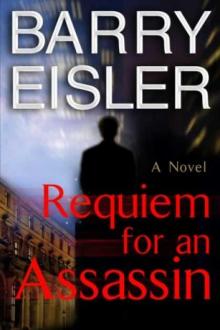 Requiem for an Assassin
Requiem for an Assassin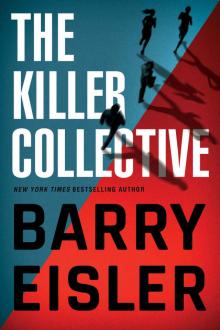 The Killer Collective
The Killer Collective The Chaos Kind
The Chaos Kind The God's Eye View
The God's Eye View Paris is a Bitch
Paris is a Bitch The Khmer Kill: A Dox Short Story (Kindle Single)
The Khmer Kill: A Dox Short Story (Kindle Single)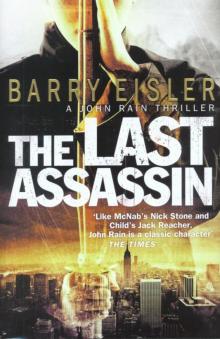 The Last Assassin
The Last Assassin The Detachment
The Detachment The Night Trade (A Livia Lone Novel Book 2)
The Night Trade (A Livia Lone Novel Book 2)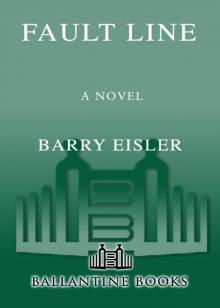 Fault Line
Fault Line Hard Rain
Hard Rain The Khmer Kill_A Dox Short Story
The Khmer Kill_A Dox Short Story London Twist: A Delilah Novella
London Twist: A Delilah Novella The Lost Coast
The Lost Coast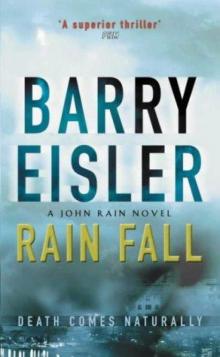 Rain Fall
Rain Fall Zero Sum
Zero Sum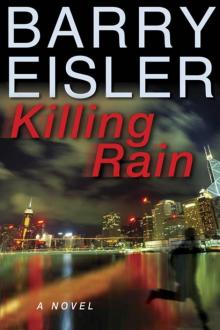 Killing Rain
Killing Rain John Rain 08: Graveyard of Memories
John Rain 08: Graveyard of Memories A Clean Kill in Tokyo (previously published as Rain Fall)
A Clean Kill in Tokyo (previously published as Rain Fall) Inside Out: A novel
Inside Out: A novel John Rain 07 - The Detachment
John Rain 07 - The Detachment Graveyard of Memories
Graveyard of Memories The Lost Coast -- A Larison Short Story
The Lost Coast -- A Larison Short Story Zero Sum (A John Rain Novel)
Zero Sum (A John Rain Novel)